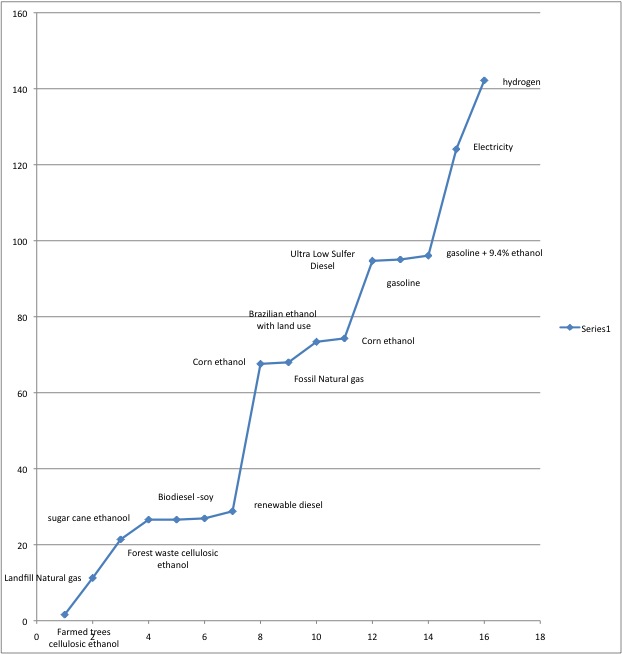CARB wheel-to-well (WTW) emissions comparison for 14 fuels
The figure below shows the total CO2 created when various fuels are produced. The vertical axis is carbon content of a fuel while the horizontal axis lists the various fuels. A good way to use the chart is to recognize that gasoline and diesel fuel at approximately 95 gm CO2/gal and are our reference value. Any fuel that has created less carbon dioxide is a better fuel to use to prevent our earth from warming up, and vice versa any fuel which generates more than 95 will do more harm to the environment than we are currently doing.
Methanol produced from natural gas using the gaseous methanol reactor technique will put about the same amount of CO2 into the air as gasoline. However, when methanol is made from organic wastes it can result in a Well-to-Wheels (WTW) NET ZERO carbon dioxide output.
It is important to note that the currently most favored solution, i.e., plug-in electric vehicles will actually harm the environment more than our existing gasoline vehicles. This is due to the fact that a large percentage of the electricity they require is made from coal -- at coal fired electricity generating stations. These plants are pouring tons of CO2 into the air, and if the country had a substantial number of plug-ins we would require even more of this electricity, therefore, more CO2. So, it is very important to look at the whole picture, and not to be fooled by thinking that because there are no tail pipe emissions, that plug-in are helping the overall environment; they are just moving the problem to another location.
We can also readily see that natural gas is considerably cleaner, with a WTW CO2 of 67. This is % less than our reference value, and thus corresponds to removing that percentage of vehicles off the road. A great start. But if we follow the Plan outlined earlier on this site, we will develop and use landfill gas (biogas) and other anaerobically generated biogas, which has a WTW CO2 value of 11. As we produce more and more biogas and mix increasing amounts with our fossil natural gas the WTW CO2 we are generating by driving will become less and less.
CO2 well-to-wheel for various fuels (from CARB)

Return to Alternative Transportation Solutions
Return to American Transportation Considerations

